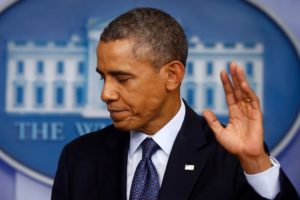By Jordan B. Rickards, Esq., and Dr. Timothy Michael Law, Ph.D., a British Academy Postdoctoral Fellow and Research Fellow of Wolfson College, Oxford
Egypt, one of the world’s oldest civilizations and arguably its first great empire, today finds itself in the throes of birthing pains attendant to progress. As the world watches waves of protestors crowding the streets, it is important to recognize that this uprising is not simply a popular revolt pitting the people against their government. It is clash of ideological movements whose respective beliefs and differences are personified in the form of two very distinct leaders. One leader represents the old world, dark, repressive, and backwards, while the other represents change, democracy, and an opportunity for renewed foreign relations. And no, the two men are not current President Hosni Mubarak and de facto opposition leader Mohamed Mustafa ElBaradei. Rather, the two ideologically polarized figures of whom we speak are President Obama 2011, and President Obama 2009.
Obama 2009, during his global apology tour, went to Cairo to “seek a new beginning between the United States and Muslims around the world,” and reminded his audience that “The United States has been one of the greatest sources of progress that the world has ever known.” During the speech he reaffirmed his commitment “to governments that reflect the will of the people,” saying he possessed “an unyielding belief that all people yearn for certain things: the ability to speak your mind and have a say in how you are governed; confidence in the rule of law and the equal administration of justice; government that is transparent and doesn’t steal from the people; the freedom to live as you choose. Those are not just American ideas, they are human rights, and that is why we will support them everywhere.”
But Obama 2011 has pledged his continued support for the Mubarak police state, one where constitutional rights are suspended, censorship is commonplace, street demonstrations are banned, the right to privacy is non-existent, and opposition leadership can be arrested and imprisoned without trial indefinitely.
In the Cairo speech, Obama 2009 acknowledged that “America has a dual responsibility: to help Iraq forge a better future, and to leave Iraq to Iraqis.” Obama 2011, however, seems oddly committed to relegating Egypt to its past, and to leave its future to anybody other than the Egyptian people.
Obama 2009 told his Egyptian audience that “no system of government can or should be imposed upon one nation by any other,” and he lamented the “tension has been fed by colonialism.” But by supporting the Mubarak regime morally and financially against a popular revolt, Obama 2011 is effectively imposing his vision for Egypt government on the Egyptian people, much the way the great monarchical European powers of the nineteenth and early twentieth century imposed their will on their colonies through unpopular governments.
Such a confused policy, however, is not unique to this president, reflecting instead years of American duplicity in the Middle East and Central Asia. Some of Obama’s most strident opponents would do well to remember Reagan’s fraternization with the Mujahideen. For decades, American presidents have turned a blind eye to evil in exchange for the preservation of one of America’s many regional interests, motivated at least in part by a sardonic belief that Middle Eastern society lacks the courage to stand up against its autocracies. But 2011 is a much different world to the one in which previous American presidents have lived, and it is one in which we can realistically imagine a tectonic shift in Middle Eastern society precisely because its people are courageously demanding change. President Obama has been given a chance to write for himself a destiny unmatched or even envisaged by any other American president. Presently, he is squandering his opportunity.
True, Secretary Clinton intensified her rhetoric on Sunday, but she did so stressing Mr. Mubarak’s good deeds and avoided siding with the Egyptian street, while Vice President Biden stated that Mubarak should not resign. European leaders, too, have ignored the asymmetrical relationship between the tactics of the protesters and the barbarous record of the regime, preferring to equate the two. There is a palpable absence of leadership, then, from nations from which we should expect the strongest solidarity with the people who are demanding an end to Mubarak’s reign, and a beginning to the human rights the United States and Europe so cherish in their own countries.
Foreign policy is not a field replete with easy answers, and indeed, reasonable people can disagree on which form of government would better suit modern Egypt — the present police state dictatorship that, to its credit, has recognized the legitimacy of the Israeli state and has sought the normalization of its relations with the greater Muslim world; or a makeshift democracy which is vulnerable to dominance by any number of extremist elements, and which is at least nominally led by an Iran apologist. But it cannot be denied that while the United States should not reflexively support every popular movement without regard of its form or intentions, neither should America continue its hegemonic policy of supporting unpopular governments. It was tried with the Shah, and that government failed. It was tried it in South Vietnam, and that government failed. It is being tried now with the corrupt and paranoid Karzai government in Afghanistan, and that too will fail. So will the Mubarak government. This is more than coincidence. These regimes fail and they do so predictably because, as history has shown, a government can only be forcibly imposed for so long, after which “you must maintain your power through consent, not coercion.”
Those words were spoken by Obama 2009. Obama 2011 would do well to heed his advice.


